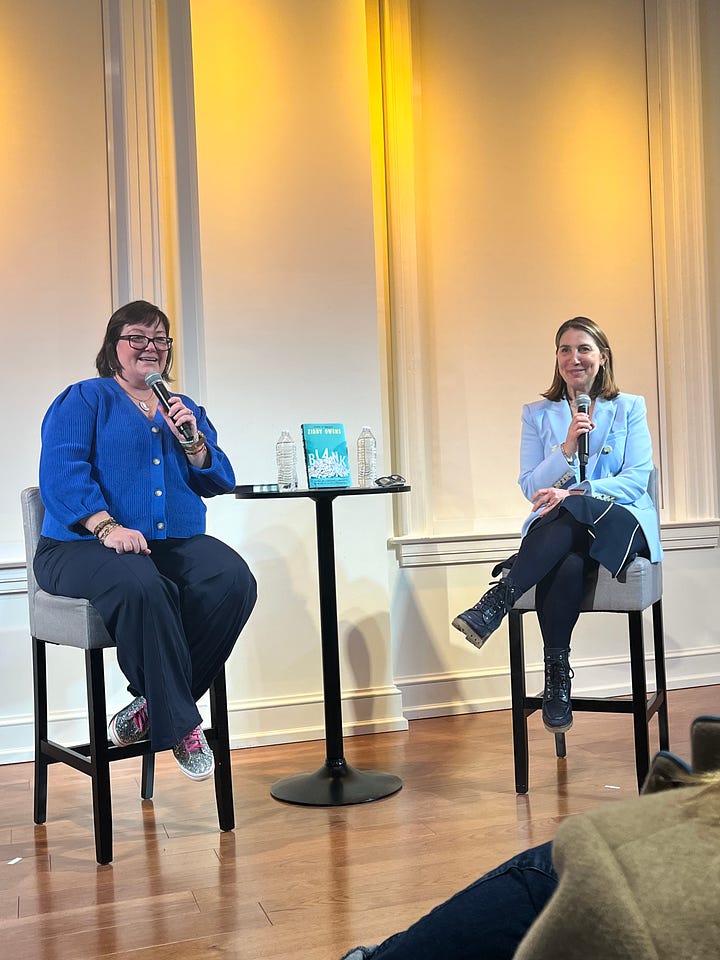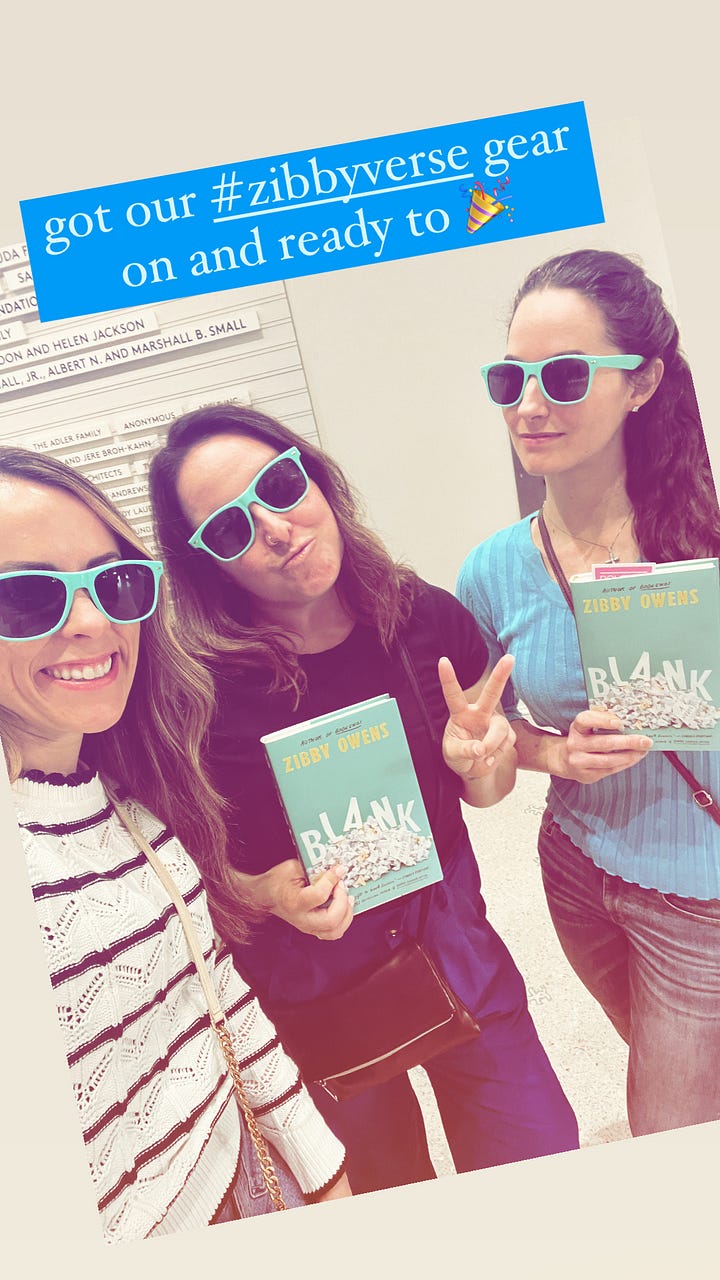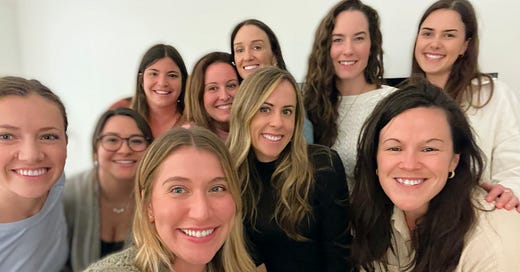Finding Your Literary Tribe
Why belonging matters at every age and how communities foster growth
A must share for the aspiring memoirists out there! I’m so thrilled to be joining this incredible group of authors on Saturday, May 11th to share tips, wisdom, and lessons from the world of memoir. My panel will explore writing about hard things - trauma, relationships, the deeply personal - and finding the universal throughline in your story. Register here!
A few months back, I was in Los Angeles at the launch of my friend Julie Chavez’s memoir, EVERYONE BUT MYSELF. Someone in the audience asked Julie what was next and I clearly remember her answer. She said something along the lines of, “I love writing. I’ll keep writing books. But I also just want to stay in the club!”
I knew exactly what she meant. From the moment I joined the writing community and writers became my “people,” I felt a sense of belonging that was both novel (no pun intended) and deeply familiar. It was like being inducted into the best kind of club - a club of people who genuinely understand your struggles, sincerely root for your success, and help you improve your craft along the way. Best of all, you don’t have to be a NYTimes bestselling author to join this club. In fact, you don’t have to have published at all. The only conditions are a shared love of words and a willingness to share of yourself.
I acknowledge that the word “tribe” is tricky, laden with anthropological and sometimes negative connotations. But it is human nature to seek out others, especially those with shared values, beliefs, and interests. Still, there are writers who attempt to go it alone. The reality of any tribe is that membership requires effort. Often it means finding your way to the front door and inviting yourself in. And that’s not always comfortable.
When I started writing seriously, I did so in isolation. I didn’t know many professional writers, and those I did know, I was too embarrassed to ask for help (I mean, they were real writers!). I wasn’t part of a writing group or even a book club, and I’d never tried to write anything longer than a graduate school thesis. So I decided to do the thing I always do in life (a habit responsible for questionable decisions such as driving a giant UHAUL two days before giving birth): I decided to do it myself.
Patterns in my life have since revealed that I was born with one tragically misinformed memo in my right hand - the one that says we’re meant to have all the answers ourselves. And unless there was a print run of only one for that particular memo, chances are you may have received it too.
Burning that memo has been an essential part of my unconditioning. If only I’d sought out writers who’d traveled and even paved the path before (in January, I wrote about the importance of mentorship). If only I’d connected with others struggling to do the same thing! Maybe I’d have saved myself the shame of not having all the answers. Or, at the very least, saved myself a few menty b walks around the neighborhood, having insensate conversations with the Greek chorus inside my head.
The latter, probably not. Such is the rite of passage of authoring a book.
In fact, it wasn’t until after I authored that book that my thinking about community began to change. I noticed authors who had books coming out around the same time as mine and befriended them on social media (some, like the brilliant author Reema Zaman, have become kindred spirits for life). I did a lot of book events and began running into the same authors over and over, discovering, in the process, that they are just normal, wonderful, approachable people.
And, most importantly, I got over myself.
I got over the idea that I could navigate and conquer the perilous terrain of book publishing alone. I got over the idea that I could make my writing the best it could be by letting no other humans read it. And, instead, I got really, genuinely, zealously excited for the other writers in my life. I became part of something bigger than myself.
Over time this extended tribe has become a lifeline. And I’m amazed at the way it continually expands. Here, there are no strangers. Only connections waiting to be made, conversations to be started, and relationships to be formed. I was reminded of this last week when a local book club selected LOVE YOU HARD as their March selection and I got to join the conversation in person, leaving with nine new friends.
These days my children see me out and about all the time, talking about writers I admire, and sometimes even gathering with them in person. They do not know me as the formerly self-conscious person I was. Nor the stubborn individualist who believed I could go it all alone.
I’m grateful to folks like
, , and other community leaders for welcoming me into their fold. And I’m grateful to myself for showing up in a way that has unexpectedly fed my soul and forced me to continue showing up, finding comfort in what used to be uncomfortable.If getting out there and finding your tribe feels daunting, consider these tips for boosting your literary citizenship (and if writing is not your thing, consider parallel acts of showing up). Building community is about stepping outside what we know. It’s about pushing through the front door.
Boosting Your Literary Citizenship (and finding community along the way):
Follow your favorite authors on social media. So simple, so easy. Take a photo of their book. Send them a message sharing that you loved it. (No author doesn’t want to hear this. I promise.)
Leave a positive review. I have a rule of only writing public reviews about art that I enjoyed. I just don’t see the point in yucking someone else’s yum in a public forum. So, if you truly loved a piece of writing, leave a review. Post a comment.
Join a writing group. Local NaNoWriMo chapters are an excellent place to get plugged into local events and nearby writers. So too are local writing organizations. In D.C., we have many! I met my current writing group through The Writer’s Center in Bethesda.
Head to your local bookstore. Make yourself a regular. Buy all the books. Keep them in business (joking, sort of). Take advantage of their author events! But seriously, show up in your human body and occupy a seat. It will mean the world to the author and the bookstore hosting them.
Stay open and say yes. “No” is a great word too, but not when we use it to keep our worlds small and safe. Do some real thinking on this. When is “no” a true boundary and when is it self-sabotage? Building community requires a lot of yeses.
Support writers on Substack and everywhere else. I sincerely love this place. It’s introduced me to writers I would never have had exposure to otherwise and I’m better for the diversified content that lands in my inbox. Reading people’s work is a gift. Paying for it is a tangible, life-changing act of support.
Community Gathering


My two new book club friends, Alicia and Caitlin, and I showed up to support author Zibby Owens at an event for her debut novel BLANK. Moderating the conversation was the hilarious and wise Meghan Riordan-Jarvis, author of END OF THE HOUR, A THERAPIST'S MEMOIR. Don’t miss this read… I’m late to the Chelsea Bieker train, but I’m fully on board. Her Substack newsletter this week is called “Writing Isn’t Hard” and it’s the most inspiring thing I’ve read in a long time.






I love this so much! And I relate to it hard. The best part of my writing journey has been the feeling I f finding my people. I love getting to connect with so many writers I admire.
So happy for you Abby, that you've found your wonderful, nurturing tribe!
I would like to introduce you to new author (and looooong-time local musician and wildlife whisperer) Mary Ann Redmond. She has recently written a book for children (of all ages!) called "Boopable." She collaborated with a fabulous illustrator named Kathy Moore Wilson to produce this loving ode to wildlife. She also wrote a song for the book!
https://www.amazon.com/Boopable-Mary-Ann-Redmond/dp/B0CTBW3Y46
Song: https://www.youtube.com/watch?v=F4Oh1gd6wZE